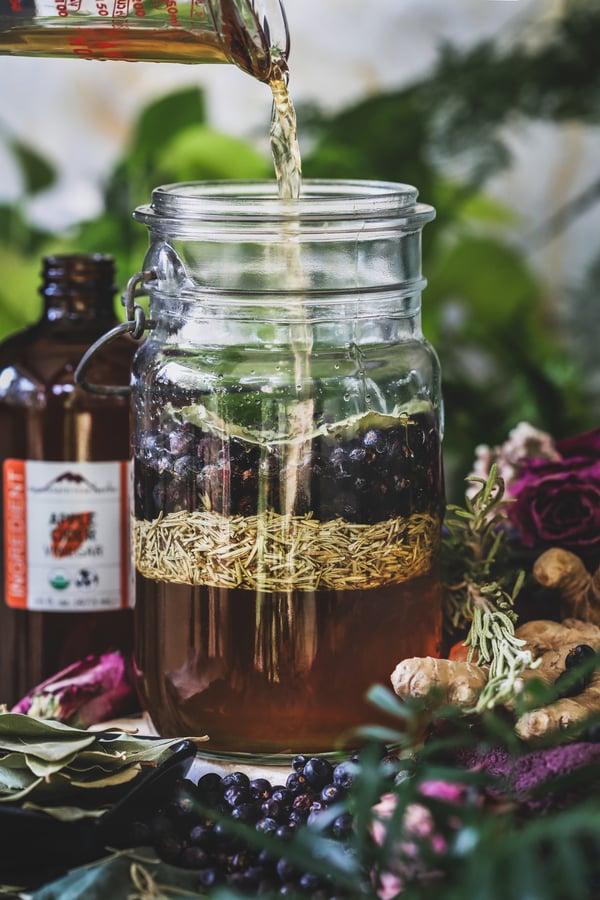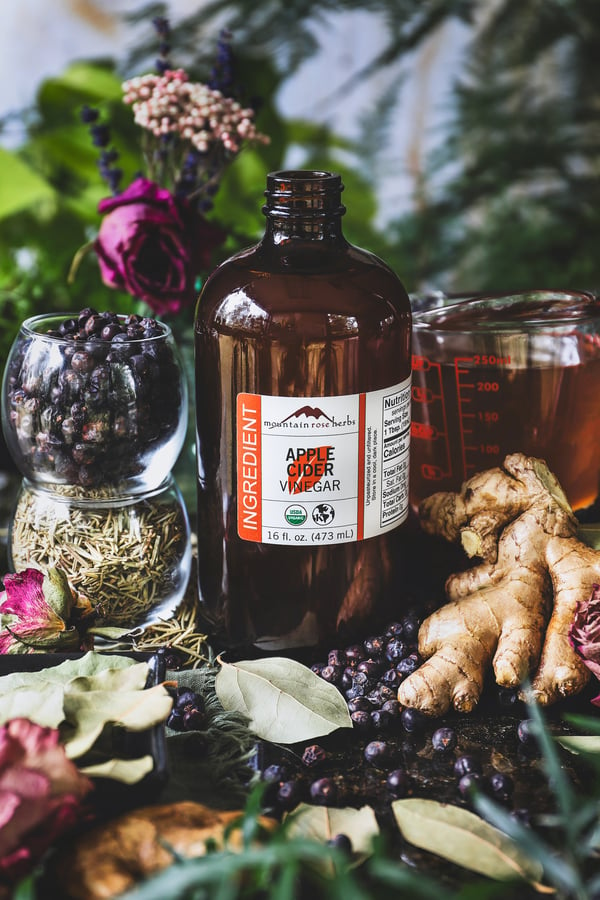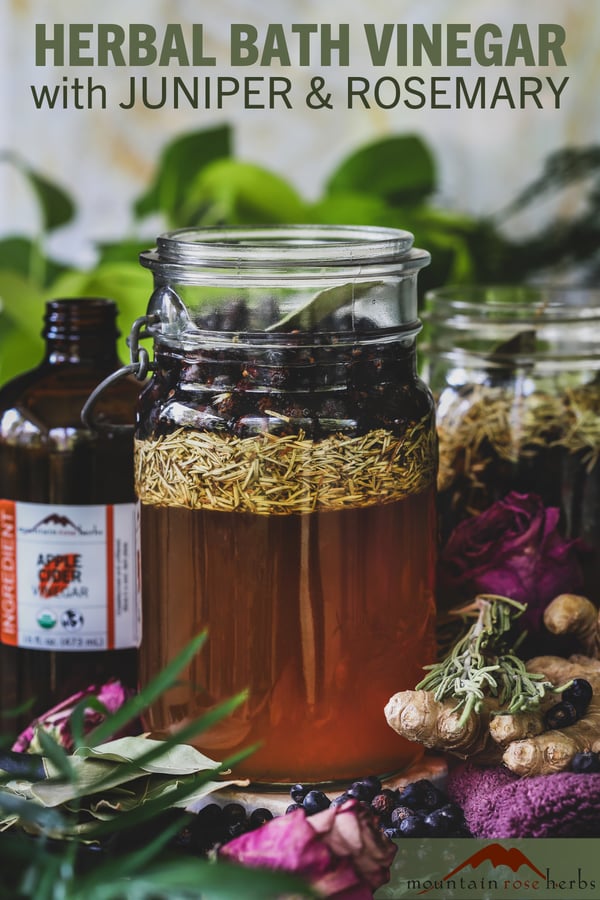If I told you there’s a pantry staple that can soothe sore muscles and calm irritated skin, would you guess it’s vinegar? It’s true! From minor aches to dry or itchy skin, I turn to herbal vinegar baths. On its own, a cup or two of vinegar in the tub will leave skin soft and rejuvenated with a healthful glow. But herb-infused vinegars take this concept a step further, using plant constituents to boost the already impressive benefits of a vinegar bath.
This juniper-rosemary blend was formulated to increase circulation, soothe sore muscles, and calm irritated skin. If tension and muscle stress build up during your work week, whether from commuting, computer work, or overdoing it in the garden, make this restorative soak a regular weekend or mid-week ritual.
How Do Bath Vinegars Work?
Healthy skin is slightly acidic, so diluted vinegar (also acidic) fosters a healthy skin microbiome and supports the skin’s barrier function. In turn, a robust barrier locks moisture in and keeps pathogens out, helping skin look and feel its best.
But there’s more. Because vinegar is a solvent that extracts beneficial constituents from herbs, we can infuse our bath vinegars with different powers depending on the herbs we use. I’ll do a deep dive on the herbs in this blend in a moment. But first …
Why Make Your Own Bath Soak?
Many of the most affordable bath soaks available today contain fragrances and chemicals that are best to avoid. Popular commercial bath soaks often contain retinyl palmitate (vitamin A palmitate), a skin-conditioning agent that has a high risk for developmental and reproductive toxicity and moderate cancer risk, according to the Environmental Working Group. They also contain fragrances that can trigger allergies or immunotoxicity, disrupt your endocrine system, and irritate your skin.
Beyond that, store-bought bath soaks generally come in plastic packaging, and reporting has shown that most plastic doesn’t get recycled even if we throw it in the correct bin.
Making your own bath products is a win-win situation. It’s easy to reduce waste, save money, and avoid synthetic chemicals by making a health-giving herbal vinegar.
Featured Ingredients
This Juniper Rejuvenation Bath Vinegar uses herbs that increase circulation, warm the body, and soothe sore muscles. As always, it’s a good idea to spot-test any new ingredients on your skin before soaking your whole body in them.
Apple Cider Vinegar
Although you can make herbal vinegars with any type of organic, uncooked vinegar—apple cider, white wine, red wine, rice—I primarily use apple cider vinegar (ACV) because of its many health benefits.
Organic, raw apple cider vinegar is easy to find and usually less expensive than specialty vinegars. Read the label to make sure you’re getting real ACV. Imitations made from white vinegar with caramel coloring do exist. Raw vinegar, which hasn’t been heated or processed, contains beneficial enzymes and is a better product than filtered, pasteurized apple cider vinegar. (Spoiler alert-Mountain Rose Herbs will be launching its own organic apple cider vinegar very soon! Be on the lookout and try it for yourself.)
Juniper Berries (Juniperus communis)
Invigorating juniper is a circulatory stimulant, helping move blood to every part of the body and ensure that nutrients are delivered to cells and that waste is removed. Pro tip: Follow up with juniper body oil after the bath to ease the winter doldrums.
Rosemary Leaf (Rosemarinus officinalis)
Rosemary also improves circulation: energizing the body and soul while calming the nervous system. If I feel a little sluggish, fatigued, or down and out, adding rosemary to my bath shifts my outlook, lifts my mood, and shifts my perspective.
Ginger Root Powder (Zingiber officinale)
Warming ginger root increases circulation and helps ease occasional aches and pains. It also helps to soothe menstrual cramps. From joint discomfort to PMS, you’ll find support in personal care rituals that include ginger.
Bay Leaves (Laurus nobilis)
According to traditional lore, bay leaves offer protection. Whether I hang them in a wreath on my door or steep them in a bath, they’re a reminder to release all that I don’t want to bring forward with me.
Juniper Rejuvenation Bath Vinegar Recipe
Ingredients
- 1/2 cup crushed dried organic juniper berries
- 1/2 cup crushed dried organic rosemary leaves
- 1 tsp.powdered organic ginger
- 3 dried whole organic bay leaves
- 3 cups organic, raw apple cider vinegar
Directions
- Crush dried herbs in a mortar and pestle.
- Fill a sterilized, quart-size jar with your prepared herbs.
- Pour vinegar over the ingredients to cover by at least two inches.
- Vinegar corrodes metal. This is the one place where I recommend using a plastic lid. Lots of recipes say to use parchment or wax paper, but after a few tries, you will see that the vinegar also eats that. A plastic lid is best for this.
- Store jar in a cool, dark place and let the herbs infuse for about four weeks. Shake the jar occasionally and check to see if you need to add more vinegar. If herbs are sticking out above the vinegar, add more vinegar.
- To decant: Place a funnel into the opening of a new clean, sterilized jar, and lay muslin or several layers of cheesecloth over the top of the funnel. Pour the vinegar through the muslin, being careful not to let the contents fall out of the side of the cloth. Let all the vinegar strain through the cloth and funnel into the clean jar.
- If you use all dried herbs, squeeze the ingredients in the muslin to extract as much liquid as possible. If you substituted any fresh herbs for dry, don’t squeeze. It will cloud your vinegar. Discard the strained ingredients into the compost. The liquid left behind is your Juniper Rejuvenation Bath Vinegar.
- Store in a clean, sterile, glass jar capped with a non-metal lid. A cork or plastic lid is ideal. Label with vinegar name and date Store away from light and heat. If stored properly, herbal vinegar should last about one year. Discard if vinegar turns dark, has floating chunks, or develops mold or a funny smell.
To use: Put 1-2 cups of infused vinegar into your bath water to increase circulation, soothe sore muscles, and support healthy skin.
My Challenge to You
Once you have the ingredients in your kitchen, this bath vinegar is simple and fun to make. The hardest part for most people will be making time for a bath! We tend to think of a long soak as excessively luxurious, telling ourselves, “If only I had the time ….”
Self-care is not, in fact, a luxury. It’s a primary element of health care—or should be, at least. When we adopt self-care rituals, we reclaim responsibility for our wellness. Slowing down is an essential part of that; slowing down allows our innate healing mechanisms to turn on.
My challenge to you is to make time for this bath. Enjoy making the recipe, then revel in the soak. Know that you’re giving your body time to do the most important work of all: maintenance and restoration of health that is supported by and woven within the offerings of our collective mother, the Earth.
Looking for other ways to add the benefits of herbs to bath time?
Check Out This Mustard Bath Soak for Tired Muscles
You may also enjoy:
- Homemade Floral Bath Bombs
- Mint Chocolate Chip Bath Truffles
- How to Make Herbal Bath Soaks, Oils, & More













